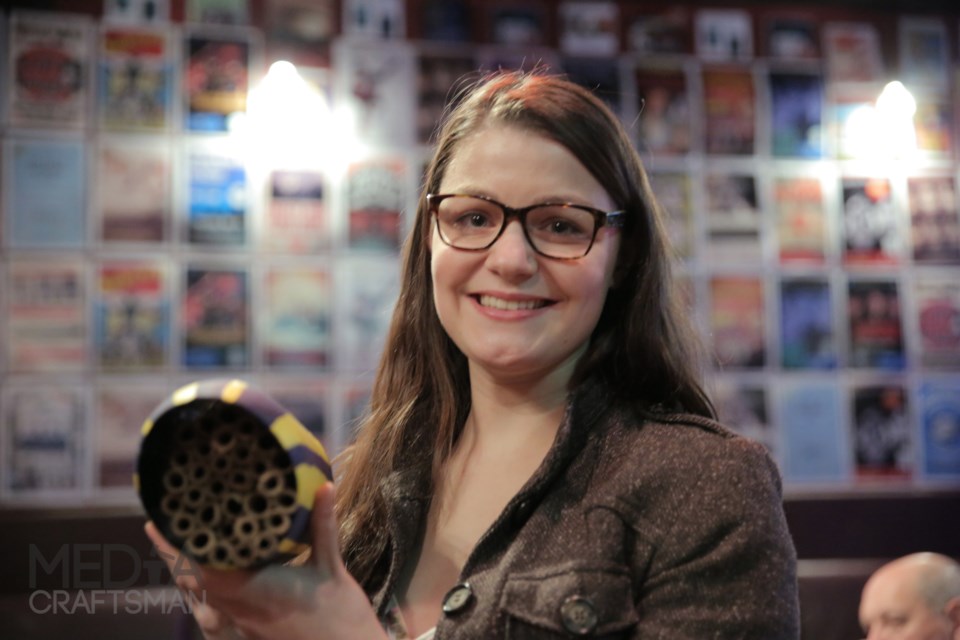A research initiative at Douglas College aims to teach people about the fabulous bugs in their gardens.
UNIBUG – the User Network for Insect Biology in the Garden – helps urban gardeners manage insect pests, such as snails and slugs, using biological controls instead of chemical pesticides. Participants work with Douglas College staff to grow plants known to attract beneficial insects, such as predatory beetles and parasitic wasps, which feed on pests that harm garden plants.
“You can attract more of those pests and provide services for them so they do a better job of pest control,” said Rob McGregor, executive director of the college’s Institute of Urban Ecology.
Veronica Wahl, UNIBUG project coordinator, said the project is started four years ago with 30 volunteers and 20 gardens and had expanded to more than 300 volunteers and 90 gardens last year.
“It’s growing like wildfire,” she said.
McGregor encourages people to get involved in the program and monitor the insects visiting their yards. He noted that Wahl visits participants and helps them identify the most common species of insects they’ll find.
“You know more about nature in your own backyard,” he said.
One of McGregor’s jobs with the program is to review the hundreds and hundreds of insects collect in “sticky traps” as part of the program.
Douglas College is adding a new component to this year’s UNIBUG program.
“We’re eager to expand our research activities to look at the important issue of native pollinators in the urban garden,” McGregor said. “Pollination is an essential part of agriculture and gardening since it allows plants to reproduce. Through this research, we want to learn more about what’s going on in local backyards and community gardens.”
Bats, bees, butterflies, hummingbirds, moths and other flying insects are among the various types of pollinators.
“We have been at it for four years,” Wahl said of the addition of looking at pollinators for this year’s program. “It’s time to shake things up a big.”
Under the direction of UNIBUG staff, residents periodically monitor the insect activity in their yards or patios to help improve understanding about “wild pollinator populations” in the region.
“It is a really great family friendly activity to introduce our community to how these insects are contributing to our food, to learn about pollution,” said New Westminster resident Jaycee Clarkson, a student assistant with the UNIBUG program and a member of New Westminster Environmental Partners. “They are very important for pollination. A lot of our food is department on pollinators.”
UNIBUG representatives attended the New Westminster Environmental Partners’ recent Green Drinks event to raise awareness about the upcoming UNIBUG forum: Bugs With Benefits.
The free forum, taking place on Saturday, March 29 from 10 a.m. to 12 p.m. in room 2201 of the Douglas College campus at 700 Royal Ave., features a talk by Elizabeth Elle, a pollination ecologist at Simon Fraser University. An expert in the field, Elle will discuss the diversity of wild pollinators, their role in plant reproduction and ways gardeners can help them survive and thrive.
The UNIBUG forum will also feature a workshop on how to build bee houses for use in home gardens. At The New Westminster Environmental Partners’ recent Green Drinks’ event, Clarkson and fellow UNIBUG student assistant Kate Sepi helped attendees make bee houses from paper tubes placed inside a plastic pop bottle.
“You can just put it up. The best thing is to leave it alone,” Sepi said. “You definitely want to keep it in the same area and not disturb it for the season.”
New Westminster Environmental Partners will be offering a harvesting cocoon session at Riverfest in September.
“In the fall we will are going to be having an event with New Westminster Environmental Partners,” Clarkson said. “We will be harvesting the mason bees. You will be unrolling the tubes. You take out the cocoons. You clean them, which gets the mites off. You store them in a dark place over the winter. You put them out in the spring.”
For more information about the forum, visit www.douglascollege.ca/visitors/urban-ecology.



